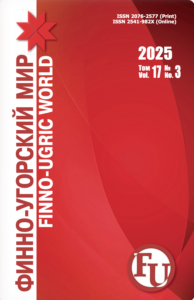DOI: 10.15507/2076-2577.011.2019.03.277-283
Communicemas with negative emotional evaluation in the Komi language
Natalia I. Guliaeva,
Candidate Sc. {Philology}, Research Fellow, Language Sector,
Institute of Language, Literature and History,
Komi Research Centre, Ural Branch of the Russian Academy of Sciences
(Syktyvkar, Russia), guljaevan@rambler.ru
Introduction. The article analyzes the communicemas with a negative emotional evaluation in the Komi language. The subject of the research is their implicit meanings and the intentions of communicants transmitted by these syntactic units. The purpose of the work is to identify and describe the most common communicemas with negative emotional evaluation in the Komi language, their pragmatic specificity, and features of functioning in speech. The results can be used for teaching the syntax of the Komi language.
Materials and Methods. The sources of the study were communicemas from Komi fiction, obtained by the method of continuous sampling. The main method was descriptive-analytical method.
Results and Discussion. Communicemas with a negative emotional evaluation arise in speech spontaneously and are an expressive reaction of the addressee, transmitting the impressions of what has been seen or heard. Usually a negative evaluation is accompanied by appropriate intonation: screaming, angry exclamation, threat, etc. These syntactic units can serve as a speech method for reducing the emotional stress of the subject. The emotional component, expressiveness in the meaning of the analyzed structures determine the impact on the addressee in order to obtain from the necessary, required reaction, which makes these syntactic constructions integral means of effective communication.
Conclusion. In the Komi language, the communicemas with a negative emotional evaluation dominate positive ones. Almost all constructions of this kind manifest national specific features, therefore they are difficult to be perceived by the speakers of other languages.
Key words: Komi language; communicant; emotional and evaluative communicemas; negative emotional evaluation.
For citation: Guliaeva NI. Communicemas with negative emotional evaluation in the Komi language. Finno-ugorskii mir = Finno-Ugric World. 2019; 11; 3: 277–283. (In Russian)






















